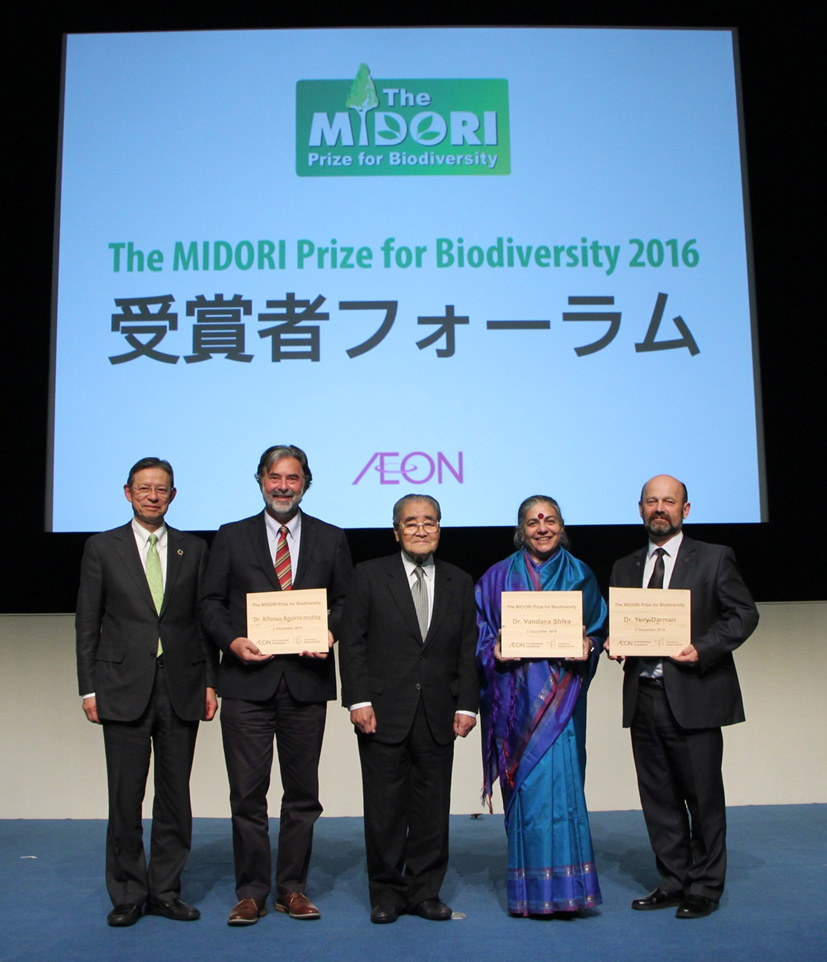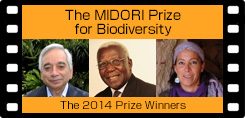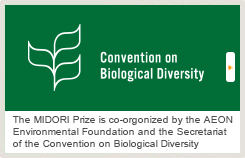26/01/2017
The MIDORI Prize for Biodiversity 2016 Winners' Forum Held
The MIDORI Prize for Biodiversity 2016 Winners' Forum was held on 7 December, 2016 at the U Thant Hall of the United Nations University, Tokyo, Japan, under the joint auspices of the AEON Environmental Foundation and the Secretariat of the Convention on Biological Diversity.
The Forum comprised lectures given by the three Prize Winners, and a panel discussion, titled “Economic Decarbonization and Biodiversity: Implications of the Paris Agreement and Sustainable Development Goals,” moderated by invitee Mr. Takejiro Sueyoshi, Trustee of the AEON Environmental Foundation and Special Advisor to UNEP Finance Initiative in the Asia Pacific Region.
Outline of the Lectures
Dr. Alfonso Aguirre-Muñoz
Executive Director, Grupo de Ecología y Conservación de Islas, A.C. (Mexico)
“Restoring Nature: Taking Care of Our Common Home”
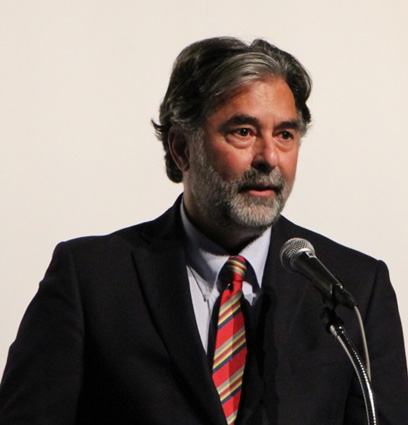
Nature – it is our common home. Nevertheless, we have destroyed this “home” over the decades, and urgently need to restore it in order to hand it down to the generations to come.
Then, how should we restore this “home”? What types of philosophies do we have at our disposal in order to restore nature?
Dostoevskii, in his novel “The Brothers Karamazov,” mentions that it is important to ask for nature’s forgiveness and mercy and to recognize problems from a self-analytical viewpoint. This moralistic attitude can result in voluntary action to care for others and nature, and has high significance also in Mexico, known for its megadiversity. Octavio Paz, a Mexican writer and Nobel Laureate, says that recognizing how we all differ can be expressed in terms of culture, dialog and love. I believe this attitude ought to be extended to nature as well, the problems of which we should tackle with modesty and objectivity. Such attitude will restore nature to its rightful place as our common home and lead to a bottom-up approach that can change societies from a civilian perspective.
Dr. Yury Darman
Director, Amur Branch, WWF Russia (Russia)
“Ecoregional Approach in Biodiversity Conservation: Amur Case Study”
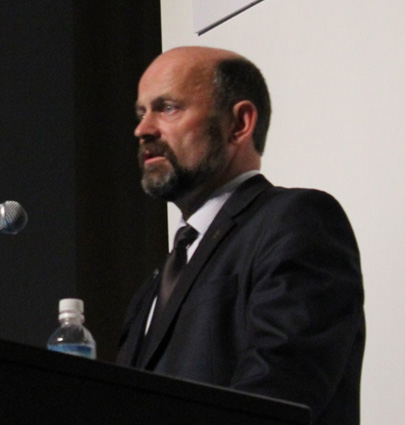
The Amur River basin contains five ecoregions designated by WWF. These vast ecosystems, known as the Amur Ecoregions, extend over 2 million km² and are rich in biodiversity. The Amur tiger, Mongolian gazelle, Japanese crane, Oriental Stork, and Sturgeon are all considered as iconic rare species, but they all live outside of the borders set by humans – thus humans need to cooperate in the space beyond such borders in order to conserve them.
WWF prioritizes what problems need to be solved through superposing analytical results with different perspectives, such as risk and socio-economic analyses. At the same time, we have conducted international conservation activities from diverse perspectives, including stationary observation, creation of protected areas, prohibition and prevention of poaching, establishment of international research stations, networking of habitats, and opening of fences set along borders to enable creatures to migrate.
In addition to these efforts, it is important for governments to cooperate. This is especially true in Russia, where the support of the President's Office plays a key role. Incorporating conservation activities into governmental strategies at the highest level has profound significance.
Dr. Vandana Shiva
Founder and Director, Navdanya (India)
“Navdanya’s Biodiversity Journey to Earth Democracy”
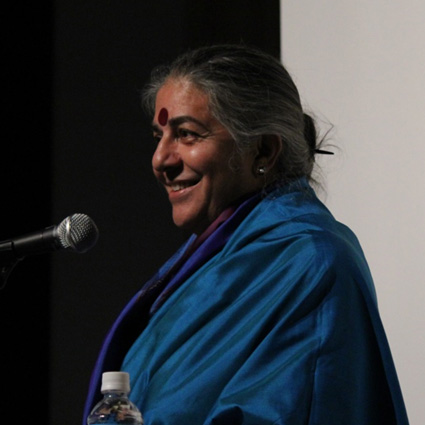
I started my journey to biodiversity through participating in the Chipko movement, a non-violent form of protest, to conserve forests in Himalaya by tree-hugging. While majoring in quantum theory, I came to understand the principle that all life is linked and that there are no boundaries between nature and humans, allies and foes. This point I found was common with environmental activities. All life co-exists on Earth, which provides habitats for all creatures, and this standpoint is also common in agriculture.
Nevertheless, seeds were “invented” and patented in modern agriculture. However, seeds are actually living, evolving things too and should not be utilized as human inventions. Farmers are forced to buy patented seeds, driving them into debt, and the resilience of these seeds has been lost due to their genetic modification. This destruction of the soil’s food web due to abuse of agricultural chemicals adversely affects climate as well as oceans. In order to protect food diversity and farmers’ rights, I started the Navdanya movement, which promotes organic farming. Our kind of organic farming is based on the “Earth Democracy” principle, which is to live in harmony with nature and respect others. Conserving biodiversity in agriculture leads us along the path to harmonization. This is our “Earth journey.”
Panel Discussion
Theme: “Economic Decarbonization and Biodiversity: Implications of the Paris Agreement and Sustainable Development Goals”
Moderator: Mr. Takejiro Sueyoshi
Trustee of the AEON Environmental Foundation and Special Advisor to UNEP Finance Initiative in the Asia Pacific Region
In September 2015, the Sustainable Development Goals (SDGs) were adopted at the UN Sustainable Development Summit, and in December of the same year the Paris Agreement was adopted at COP 21. It is considered that biodiversity and climate change can together fundamentally change the future of nations, businesses, individual lifestyles and societies, and these two issues were chosen as the theme for a panel discussion, which turned into a lively debate.
